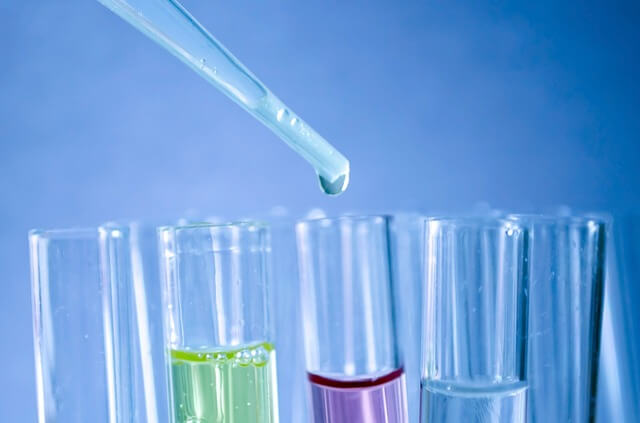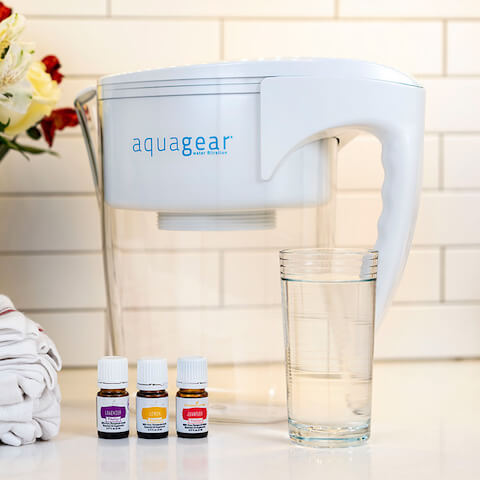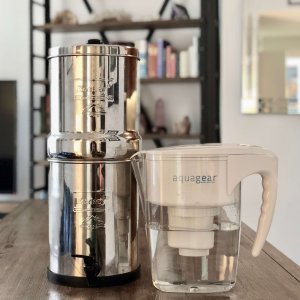Everyone knows we cannot live without water. In fact, water makes up over 60% of our bodies, and our blood is over 90% water. We use water for so many things that we typically don’t think twice about turning on the faucet. Water should be a life-giving substance. But unfortunately, it is all too often treated with processes and exposed to harmful chemicals. Sadly, in some cases, that big bottle of drinking water may actually do more harm than good. Read on to learn about the dangers of tap water and the importance of water filtration.

What’s in Your Water?
Fluoride
Artificial water fluoridation began in the U.S. in the 1940’s as a measure to prevent tooth decay. But evidence shows that the risks from consuming fluoridated water may outweigh the benefits for some individuals. For more information about the health risks of fluoride, check out this post.
Chlorine

Chlorine is a highly efficient disinfectant added to public water supplies to kill disease-causing bacteria. But chlorine also poses many health risks. Among these are: bladder cancer, colon cancer, birth defects, and possible thyroid dysfunction.
Arsenic
Although the EPA has strict regulations about the testing and removal of arsenic from public water supplies, you may still be at risk. Over half of U.S. states are not up to par on meeting their compliance. Furthermore, arsenic is even more common in well water. It originates from natural deposits in the earth or industrial and agricultural pollution and leaches into the underground aquifers. The long list of negative effects of arsenic are well substantiated. From many types of cancer, to cardiovascular disease, to diabetes, reproductive issues and neurological effects, arsenic is a poison that has no business in your water bottle.
Lead
Lead is a highly poisonous heavy metal found in mineral deposits in the earth’s crust. Due to its non-biodegradable nature, its concentration accumulates in the environment with increasing hazards. Because of soil runoff, lead contamination in drinking water poses a risk, especially in well water. Corrosion of service pipes is another source of lead in municipal water supplies. Lead affects almost every organ in the body. Among the negative effects are: anemia, increased blood pressure, miscarriage, brain and kidney damage, birth defects, infertility, blood disorders, and even death.

Mercury
The major source of mercury in tap water is from natural degassing of the earth’s crust. The EPA admits that mercury in water has the potential to cause kidney damage and other health complications from even short-term exposures. Mercury has profound cellular, cardiovascular, hematological, pulmonary, renal, immunological, neurological, endocrine, reproductive, and embryonic toxicological effects.
Volatile Organic Compounds
Volatile Organic Compounds (VOCs) are compounds that easily become vapors or gases. Many consumer, industrial, and agricultural products release these compounds, which then end up in our water supply. VOCs include, but are not limited, to fertilizers, herbicides, paints, solvents, preservatives, household cleaners, etc. This stuff gets in our water and not only poses a risk when we ingest it, but also from undetectable off-gassing.
The EPA reports 23 common VOCs in tap water that pose health risks. Depending on the specific chemical—from benzene to toluene—the effects are alarming. Among those listed by the EPA are cancer and problems with the nervous, circulatory, lymphatic, reproductive and immune systems. Additionally, VOCs may impact the kidneys, adrenals, liver, thyroid, stomach, spleen. . .the list goes on.
Water Filtration
Gone are the days of innocently turning on the tap for a glass of clean water, folks. Sadly, it is alarmingly important to use a high-quality water filter and have your water tested on the regular. Because there are so many options out there, choosing a water filter can be overwhelming.
What to Look For in a Water Filter
It is vitally important to do your research before choosing a water filter. Many of them do nothing more than remove solid particles. Check for testing and verification of claims. And by all means, make sure that the filter is removing the nasty stuff you don’t want in your water.
One water filter I recommend is the Aquagear filter. They provide independent testing certificates that show that their pitchers remove 89 water contaminants. The water from my Aquagear tastes crisp and clean, and I know I don’t have to worry about any of the contaminants described above.
What’s more is that a portion of their proceeds go to the non-profit Aquagear Foundation. For every filter purchased, they provide six months of clean water to a developing community. That’s something I can drink to.
What about you? Do you have a water filter you love?
You may also be interested in this post where I share my thoughts about Water Filter Options.




